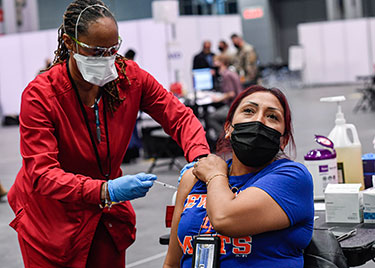COVID-19 vaccines have brought Americans hope that the pandemic might soon be at an end. But with three different vaccines now authorized by the Food and Drug Administration, consumers are wondering: Are they all the same?
William Schaffner, MD, medical director of the National Foundation for Infectious Diseases and a professor of preventive medicine and infectious disease at the Vanderbilt University Medical Center in Nashville, Tennessee, helps clear the air.
Vaccines from Moderna, Pfizer and Johnson & Johnson have received emergency use authorization. They each protect against hospitalization and death. But in clinical trials, the third one was somewhat less effective in preventing illness. Should people factor that in when getting a vaccine?
You can't compare them on their face. Did the vaccines keep people out of the hospital, off of ventilators and did the vaccines prevent them from dying? And in that critical perspective, they are all in the same ballpark.
When I'm asked, “Which is the best vaccine,” I can answer in a very straightforward way: the one that's available to you today. Roll up your sleeves and get it. Don't be picky. Get vaccinated.
From a consumer perspective, what are some of the key differences between the first two vaccines and the new one from Johnson & Johnson?
It's a single-dose vaccine. Another is that it can be managed perfectly in normal refrigerator temperatures. With the Moderna and the Pfizer vaccines, we have to bring people to those special locations where those vaccines are (due to special storage requirements).
By May, we should have enough doses to provide the vaccine to all comers. It's at that point that we're going to have to provide even more energy and outreach to get to those populations who are continuing to be hesitant and reluctant and skeptical.
Recent polling suggests vaccine hesitancy in Black communities has been overestimated. However, vaccine hesitancy is high among politically conservative Americans. How do we address their concerns?
Some of the vaccine hesitancy, we have to acknowledge, has a political veneer. And as we like to remind everyone — this virus doesn't care who you voted for or if you voted at all. What we would not like to have are subpopulation neighborhoods and communities that, because of their political inclinations, have not been accepting of the vaccine. This virus produces disease in all comers, and has no political affiliations. It would help if we could get major political leaders to actually advocate for vaccine, state as well as national.
Similarly, we would like people representing our diverse communities to make that same recommendation. People respond to people who are like them, whom they respect.
This month marks one year since the pandemic began spreading widely in the U.S. What are your thoughts on the milestone?
My colleagues, whether in clinical medicine or in public health or in research, have just devoted themselves almost completely to COVID, and we're continuing to do that. Fortunately, we're seeing some light at the end of the tunnel with the vaccines.
There are many lessons that we have learned and one of them is that, in the United States, we're going to have to do much better the next time around. We recognize that one of the most important aspects of COVID response is clear — sustained, understandable, science-based communication to the general public. And it should come principally from the public health leadership in this country, not from politicians.
Another lesson is that we need a national program, not a program state by state. We need national unity and national commitment and determination. All of us together.
I am so proud and grateful to all of my colleagues in public health. It is a calling, and you are all responding in the grand tradition of public health that extends back through the ages. This will be a proud chapter in public health history on the basis of all your individual contributions.
This interview was edited and condensed.
Maria Diaz, a worker with Metropolitan Transportation Authority of the State of New York, receives a COVID-19 vaccination in January. (Marc A. Hermann/MTA New York City Transit)